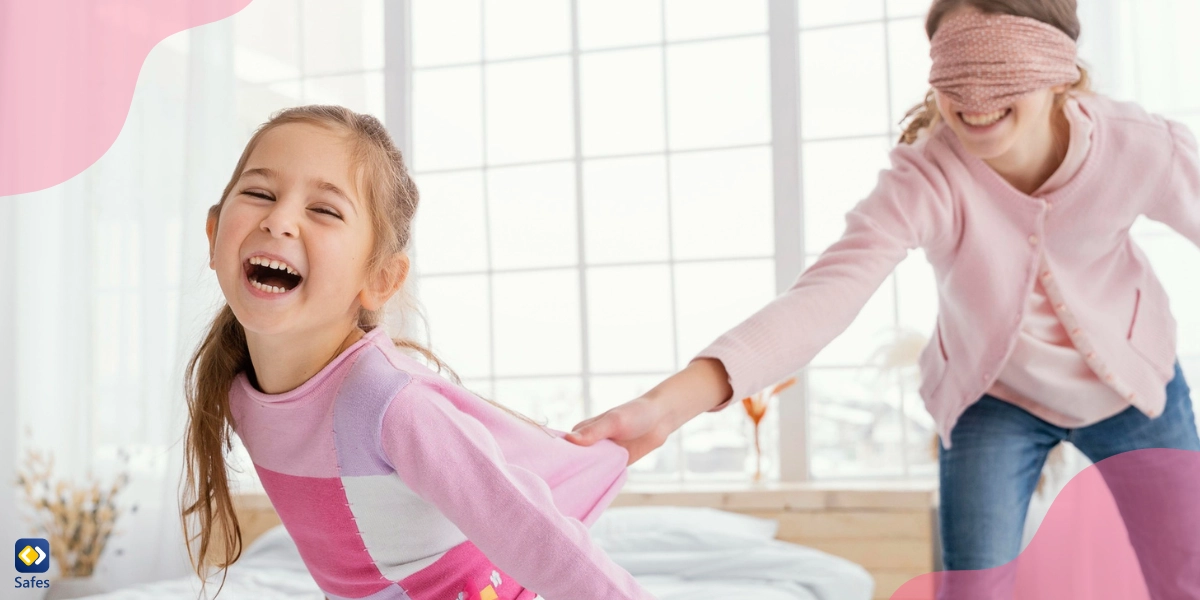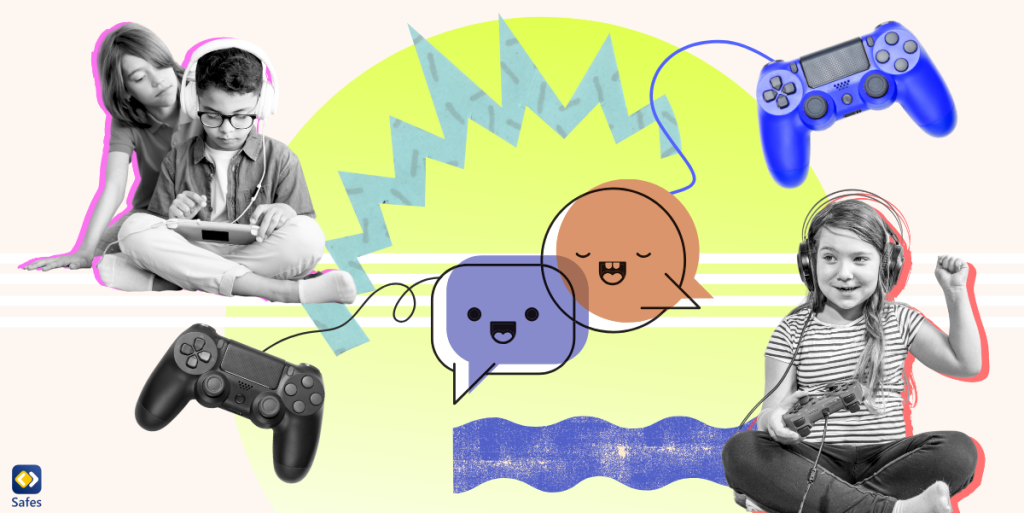Children, these balls of energy and life, often like to engage in boisterous and spirited playing. From wrestling in the living room to participating in a pillow fight, roughhousing has been an all-time favorite among children. Since there is a lot of energy involved in these games, increasing the possibility of a shattered vase or a black eye, parents have been mostly trying to tone down the crazy and encourage children to control their emotions. However, roughhousing might not be that bad for children’s emotional regulation. This blog post discusses with concerned parents how roughhousing – if done properly, of course! – boosts emotional regulation.
Download and Start Your Free Trial of the Safes Parental Control App
Understanding Emotional Regulation
Emotional regulation is the ability to control one’s emotions in different situations. Compared to adults, children have weaker emotional regulation skills: A peaceful game can easily turn violent; not getting exactly what they want can lead to a tantrum and ruin everybody’s mood. Emotional regulation is very important because it helps children have healthier relationships in the future. Plus, this skill has been shown to be effective in the prevention and treatment of mental health problems. The good news is that emotional regulation is not an innate trait but something that can be learned and honed with proper upbringing. One of the ways to nurture emotional regulation is through roughhousing.

The Role of Roughhousing in Emotional Development
Roughhousing is any rough-and-tumble play that involves physical activity and lots of energy. Roughhousing examples include:
- Piggyback rides
- Wrestling
- Tickle fighting
- Play fighting
- Rolling around
On the surface, roughhousing might seem like chaotic and aggressive fun. However, it can serve as a healthy outlet for pent-up emotions and energy. Plus, being extremely fun helps strengthen relationships between the child and the person who plays with them. Finally, the way children get to express themselves physically with these games can also help them develop emotional regulation skills since engaging in physical activity in early childhood has been linked to the development of emotional regulation.
Building Emotional Resilience Through Roughhousing
Imagine this scenario: Two children are playfully wrestling with each other. One of them turns around in an attempt to win, causing the other one to scrape a knee. Now, this can spiral into a big fight or a chance for children to learn how to communicate, express their feelings, and solve a small conflict.
Emotional resilience is the ability to bounce back from adversity, and roughhousing can play a significant role in developing this trait because it serves as a metaphor for everyday life: Children can learn that sometimes they might get hurt or frustrated even when they’re having fun. But they should be able to endure the challenge and try to control their feelings in these times.
Setting Boundaries and Teaching Control
As much fun as roughhousing might be, it can also be dangerous if left uncontrolled. Even little kittens sometimes scratch or bite each other too hard when they’re playing. These games should have rules that ensure the participants’ safety. For example, even if your children are play fighting, they should be aware that kicks and punches in the face are not acceptable. A useful rule of thumb during roughhousing is to know that the goal here is to have fun and that they should be careful not to hurt each other at all times. They should also know that sometimes things can happen while playing that they wouldn’t want, but they should be able to control their anger and use words instead. Also, it’s best that you be present during these sessions to supervise and intervene if necessary.

Communication Skills and Emotional Intelligence
Another benefit of roughhousing with toddlers is that it can nurture two essential skills in them: social skills and emotional intelligence. These games require a high level of physical and verbal interactions, which can teach children how to connect with their playmates, and subsequently, with other people in the future.
Emotional intelligence, on the other hand, is the ability to understand and control your own and other people’s emotions. A person with emotional intelligence knows how to compromise in case of conflict, empathize with others, and build strong relationships. Imagine a scenario where a parent and child are playfully wrestling, and the child says, “When you tickle me sometimes you pull my hair, and I don’t like it.” This situation gives the child a chance to freely express themselves and figure out a way around problems.
Recognizing and Managing Aggression
We should acknowledge that roughhousing can easily become aggressive and violent. It might be hard to distinguish a fun and light game from aggressive behavior. Therefore, knowing the signs that indicate things might be going wrong is essential for parents:
- Name-calling or hurtful language
- Intentionally hurting the other person
- A refusal to stop when the other person is clearly upset
- Frowning, crying, shouting, and frustration
- Power imbalance toward one participant
If you see these signs, stop the game, encourage the participants to take a deep breath, and have an open conversation about what went wrong.
Age-Appropriate Roughhousing Activities:
Roughhousing activities should be age-appropriate to ensure safety and enjoyment. Here are some examples for different developmental stages:
- Toddlers (1-3 years): Gentle tickling, soft tossing onto a bed, or rolling on the floor
- Preschoolers (3-5 years): Playful chasing games, bear hugs, and light wrestling
- School-age children (6-12 years): More structured wrestling with rules, pillow fights, and rough-and-tumble play
- Teens (13+ years): Wrestling, play fighting, and team sports like football or rugby
Remember that each child is unique and has their own preferences. So, don’t be afraid to customize the game and make it fun but also safe.
Tips for Safe and Effective Roughhousing
To ensure safe and enjoyable play, here are some practical tips for parents:
- Clear the play area of any hazards or obstacles.
- Use soft surfaces like carpets or mats for play.
- Encourage kids to wear comfortable clothing that allows free movement.
- Teach your child to communicate their boundaries and respect others.
- Be attentive and ready to intervene if the play becomes too rough or aggressive.
- Always prioritize safety and well-being over competition.
If you’re reading this article, it probably means that you have children. A common parents’ concern today is their children’s safety on the internet. We would like to suggest a solution for this widespread problem: Safes parental control app! With Safes, you can track all of your children’s activities on the internet and make sure they don’t encounter any inappropriate content or people online. Plus, you can limit their screen time and ensure they spend enough time on real-life activities. Discover how Safes can enhance your child’s online safety. Sign up for a free trial today to start protecting them. Safes is easy to use and can be installed on all devices, such as iOS, Android, and Windows.
Conclusion
Roughhousing with toddlers or children, in general, may seem dangerous and uncontrollable at first sight. However, contrary to popular belief, it has been proven to have many benefits for them. Young people are full of energy, and they need a hobby to focus their energy on. Roughhousing can be a good way to get up and have some fun. But it’s not just fun; it also helps the development of emotional regulation, anger management, communication skills, and emotional resilience. So, next time your children are piggyback riding or having a pillow fight, instead of scolding them, roll up your sleeves and join in!
Your Child’s Online Safety Starts Here
Every parent today needs a solution to manage screen time and keep their child safe online.
Without the right tools, digital risks and excessive screen time can impact children's well-being. Safes helps parents set healthy boundaries, monitor activity, and protect kids from online dangers—all with an easy-to-use app.
Take control of your child’s digital world. Learn more about Safes or download the app to start your free trial today!




